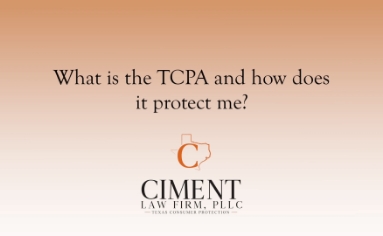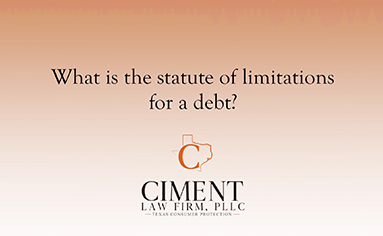We're here to help you.
info@cimentlawfirm.com

Debt Lawsuit Defense Lawyer In Katy, TX
Far too many people think that the case is all but over when a creditor files a lawsuit. They assume that no matter what they do, the court will find in favor of the creditor. That belief is buried so deep within them that they don’t try to fight back. In reality, a debt lawsuit defense lawyer in Katy, TX, can mount a legal defense and protect your rights. Find out how a defense attorney from the Ciment Law Firm can defend you in court.
Defense Strategies for a Debt Lawsuit in Katy, TX
Your debt lawsuit defense lawyer in Katy, TX, will develop a defense strategy for your case. Some possible options include:
Ask Us A Question, Tell Us Your Situation,
Or Schedule A Call With Us
Call (833) 637-1075 or fill out the short form below. We will respond on the same day if you’re reaching us before 5pm – otherwise, next business day. Don’t hesitate: We welcome your questions!
We respect your privacy. The information you provide will be used to answer your question or to schedule an appointment if requested.
Statute Of Limitations For Debt Lawsuits In Katy, TX
Texas has imposed a four-year statute of limitations on collecting a debt. Texas law is among the most consumer-friendly in the nation. While most states restart the clock on the statute of limitations when a payment is made, that’s not the case in Texas. Creditors have four years to file a lawsuit against you after you defaulted on your debt. If they fail to do so, your Katy, TX, debt lawsuit defense lawyer will file for dismissal based on the statute of limitations.

What Happens If You’re Sued After Payment?
If you’ve paid your debt, you don’t expect to receive paperwork for a debt collection lawsuit. This does happen from time to time, especially if the debt has been transferred to a third-party collection agency. You paid the original creditor, but it failed to inform the collection agency. Your debt lawsuit defense lawyer in Katy, TX, will provide proof of payment, so you will not be forced to pay the debt again. This could also be a violation of your rights which you could potentially sue the debt collector.

Potential Outcomes Of A Debt Lawsuit
If you are being sued for a past-due debt, the case has four potential outcomes. First, your debt lawsuit defense lawyer in Katy, TX, will review the evidence to see if the case can be dismissed. If the case cannot be dismissed, you might be eligible for a settlement. Your case also might go to court. Your attorney will present evidence, and the judge might rule in your favor. If not, the judge will issue a judgment, so the plaintiff can collect the debt.

Contact Our Debt Lawsuit Defense Lawyer In Katy, TX
Don’t try to handle a debt lawsuit on your own. Stand up to your creditors and protect your rights with the help of a Katy, TX, debt lawsuit defense lawyer. Schedule a free consultation with an attorney from the Ciment Law Firm by calling 833-637-1075.

Why Choose The Ciment
Law Firm, PLLC?
- Free ConsultationFind out which debt resolution option is best for you during a free consultation.
- Positively ReviewedOur firm has numerous positive reviews on Google, Avvo, and other websites.
- Options for All NeedsFrom bankruptcy protection to judgment lien releases and student loan assistance, our firm provides ample options to resolve your debts.
- Experience on Both Sides of the FieldDaniel Ciment started his career at a debt collection law firm and now protects those in debt. His experience on both sides allows him to find solutions for his clients.
- Compassionate and TransparentPatient and knowledgeable, the team is available to answer all questions and explain the process so that clients can reach their desired outcome.
- Six Office LocationsSchedule your appointment at an office in Katy,

Statute Of Limitations For Debt Collection Lawsuits
Many people are surprised to learn that there is a statute of limitations for debt lawsuits. The statute of limitations in Texas is four years from the date of default. Unlike many other states, you will not reset the statute of limitations if you make a payment on the debt after the default date. Also, the collection agency must notify you when the statute of limitations has expired. Even though you can’t be legally sued after the statute of limitations has expired, some debt collections will still attempt to get a judgment in court. By using the statute of limitations defense, you can get the case dismissed.
Learn more
Getting Sued For A Debt After It Has Been Paid
Sometimes, people end up in court for a debt collection lawsuit after paying the debt. This generally happens when the creditor sold off the debt to a third-party collection agency. People pay the original creditor, not realizing the debt has been sold. The collection agency does not realize the debt has been paid, so it brings a lawsuit against the debtor. Providing proof of payment is a valid debt collection lawsuit defense. If payment has been made, the debt collection agency does not have legal recourse to collect additional money.

Debt Defense Lawsuit Outcomes
Debt defense lawsuits in Texas have four possible outcomes. Sometimes, lawsuits are dismissed before the case goes to court. For example, if the statute of limitations has passed, the legal team can get the case thrown out. Second, the debt lawsuit defense lawyer might negotiate a settlement for less than the amount owed. Third, the plaintiff might prove the debt and get a judgment for the full amount. Fourth, the defense attorney might invalidate the debt, so the judge rules in your favor. Hiring a debt defense lawyer is a vital step in reaching the desired outcome.

Don’t Ignore A Debt Collection Lawsuit
Ignoring a debt collection lawsuit is not wise. If the defendant doesn’t respond or appear in court, the judge can issue a default judgment in favor of the plaintiff. The court will also determine how the plaintiff can collect the funds. The court might allow the plaintiff to put a lean against the defendant’s homestead, garnish bank accounts, or seize non-exempt property. The judgment can also be reported to the three credit bureaus, hurting the consumer’s credit.
video faqs
GET A PERSONALIZED DEBT RESOLUTION SOLUTION how can the debt defenders help?











